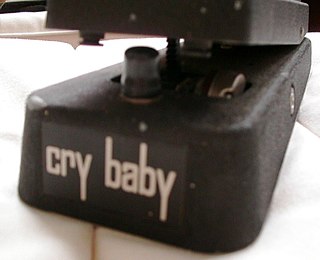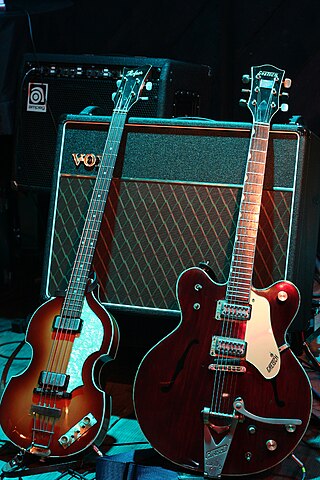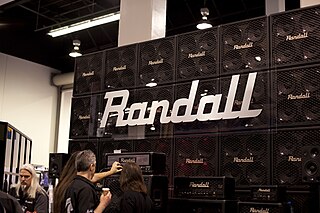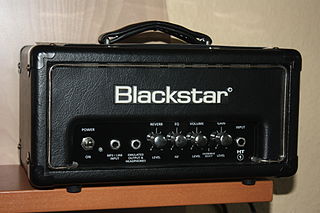
Vox is a British musical equipment manufacturer founded in 1957 by Thomas Walter Jennings in Dartford, Kent, England. The company is most famous for making the Vox AC30 guitar amplifier, used by The Beatles, The Rolling Stones, The Kinks, The Yardbirds, Queen, Dire Straits, U2, and Radiohead; the Vox Continental electric organ, the Vox wah-wah pedal used by Jimi Hendrix, and a series of innovative electric guitars and bass guitars. Since 1992, Vox has been owned by the Japanese electronics firm Korg.

A wah-wah pedal, or simply wah pedal, is a type of effects pedal designed for electric guitar that alters the timbre of the input signal to create a distinctive sound, mimicking the human voice saying the onomatopoeic name "wah-wah". The pedal sweeps a band-pass filter up and down in frequency to create a spectral glide. The wah-wah effect originated in the 1920s, with trumpet or trombone players finding they could produce an expressive crying tone by moving a mute in, and out of the instrument's bell. This was later simulated with electronic circuitry for the electric guitar when the wah-wah pedal was invented. It is controlled by movement of the player's foot on a rocking pedal connected to a potentiometer. Wah-wah effects may be used without moving the treadle as a fixed filter to alter an instrument’s timbre, or to create a "wacka-wacka" funk-styled rhythm for rhythm guitar playing.

A guitar amplifier is an electronic device or system that strengthens the electrical signal from a pickup on an electric guitar, bass guitar, or acoustic guitar so that it can produce sound through one or more loudspeakers, which are typically housed in a wooden cabinet. A guitar amplifier may be a standalone wood or metal cabinet that contains only the power amplifier circuits, requiring the use of a separate speaker cabinet–or it may be a combo amplifier, which contains both the amplifier and one or more speakers in a wooden cabinet. There is a wide range of sizes and power ratings for guitar amplifiers, from small, lightweight practice amplifiers with a single 6-inch speaker and a 10-watt amp to heavy combo amps with four 10-inch or four 12-inch speakers and a 100-watt amplifier, which are loud enough to use in a nightclub or bar performance.
Seth E. Lover was a designer of amplifiers and musical instrument electronics and effects. He is most famous for developing the Gibson humbucker or hum-cancelling electric stringed instrument pickup, most often used on the electric guitar.
Orange Amps is an English amplifier manufacturing company, noted for their products' distinctive sound and the bright orange Tolex-like covering of their heads and speaker cabinets. The company was founded in 1968 by Cliff Cooper, who decided to build his own amplifiers when vendors refused to supply his West End musical instrument store, Orange Store, due to Cooper's youth and countercultural image. Cooper also founded related companies, including the Orange record label in 1969.

Marshall Amplification is a British company that designs and manufactures music amplifiers and speaker cabinets. Founded in London by shop owner and drummer Jim Marshall, the company is based in Bletchley, Milton Keynes, England. Since March 2023, Marshall Amplification has been one of several divisions of the Swedish conglomerate, the Marshall Group.

Mesa/Boogie is an American company in Petaluma, California, that manufactures amplifiers and other accessories for guitars and basses. It has been in operation since 1969.

Ampeg is a manufacturer best known for its bass amplifiers.

Matchless Amplifiers is a Los Angeles-based company which designs and makes electric guitar amplifiers, specializing in class-A tube circuitry.

Hiwatt is a British company that manufactures amplifiers for electric guitars and electric basses. Starting in the late 1960s, together with Marshall and Vox, Hiwatt contributed to the sonic image popularly termed "British sound".

James Charles Marshall known as The Father of Loud or The Lord of Loud, was an English businessman and pioneer of guitar amplification. His company, Marshall Amplification, founded in 1962, has created equipment that is used by some of the biggest names in rock music, producing amplifiers with an iconic status.

The Vox AC30 is a guitar amplifier manufactured by Vox. It was introduced in 1958 to meet the growing demand for louder amplifiers. Characterised by its "jangly" high-end sound it has become widely recognized by British musicians and others, such as George Harrison and John Lennon of the Beatles, Bill Wyman of the Rolling Stones, Brian May of Queen, Dave Davies of the Kinks and Hank Marvin.

Distortion and overdrive are forms of audio signal processing used to alter the sound of amplified electric musical instruments, usually by increasing their gain, producing a "fuzzy", "growling", or "gritty" tone. Distortion is most commonly used with the electric guitar, but may also be used with other electric instruments such as electric bass, electric piano, synthesizer and Hammond organ. Guitarists playing electric blues originally obtained an overdriven sound by turning up their vacuum tube-powered guitar amplifiers to high volumes, which caused the signal to distort. While overdriven tube amps are still used to obtain overdrive, especially in genres like blues and rockabilly, a number of other ways to produce distortion have been developed since the 1960s, such as distortion effect pedals. The growling tone of a distorted electric guitar is a key part of many genres, including blues and many rock music genres, notably hard rock, punk rock, hardcore punk, acid rock, and heavy metal music, while the use of distorted bass has been essential in a genre of hip hop music and alternative hip hop known as "SoundCloud rap".

Pignose-Gorilla, commonly known as Pignose, is a manufacturer of portable, battery-powered guitar amplifiers, as well as AC-powered practice amps and guitars. The company was founded in 1969 by Richard Edlund and Wayne Kimbell. In 1985, Pignose Industries was acquired by Howard Chatt and called Pignose - Gorilla. In 2023, Pignose was acquired by Aria guitars, based in Japan. In the United States, Pignose is distributed by LPD Music International, based out of Madison Heights MI.
Vintage Guitar is an American magazine that focuses on vintage and classic guitars, amplifiers, effects, and related equipment, as well as notable guitarists from all genres and eras. The publication's feature stories and monthly columns cover a diverse range of topics by contributors, including some of the biggest names in the industry and renowned authorities like Dan Erlewine, George Gruhn, Wolf Marshall, Richard Smith, and Seymour W. Duncan, as well as some of the best-known writers in the field, including Pete Prown, Walter Carter, Dan Forte, Dave Hunter, Rich Kienzle, Michael Dregni, John Peden, Greg Prato, and others.
This is a list and description of the guitars and other equipment played by musician Stevie Ray Vaughan. Vaughan played a number of Fender Stratocasters throughout his career, one of which, a 1963 body and a 1962 neck, became "the most famous battered Strat in rock history." He was notoriously hard on his guitars, and many of them required extensive periodic maintenance, as well as other equipment. He used a limited number of effect pedals, and favored Fender and Marshall amplification.

Randall Amplifiers is a manufacturer of solid-state and tube guitar amplifiers. Randall Amplifiers is currently a brand of U.S. Music Corp., a subsidiary of Canadian corporate group Exertis | JAM.
The Fender Deluxe guitar amplifier is a range of non-reverb guitar amplifiers produced by Fender. The amplifiers were originally produced from early 1948 to 1966 and reissues are in current production. Its predecessor was the Fender Model 26 "Woodie" produced from 1946 to 1948.

Blackstar Amplification is a British company that produces and manufacturers guitar amplifiers and effects units. The company was founded by a group of ex-Marshall employees, most notably Bruce Keir, who became technical Director at Blackstar, and former Chief Design Engineer at Marshall, Ian Robinson. In 2009 the company began operations in the United States. The majority of the research and development for Blackstar is carried out in the UK. Blackstar is endorsed by major artists like Ozzy Osbourne, Neal Schon, Opeth, and Richie Sambora of Bon Jovi. Blackstar has been consistently ranked amongst the best amplification brands by leading guitarists. Bruce Keir died in September 2021 at the age of 60.
Trainwreck Circuits is an American company that manufactures boutique guitar amplifiers. The company was founded by Ken Fischer in 1985. Trainwreck amplifiers are made in Colonia, New Jersey.















